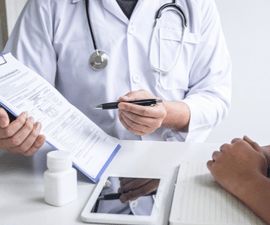
Coping with Lymphoma
Follow-up Care

No standard guidelines currently exist for how often lymphoma survivors should be monitored for cancer recurrence and late health effects from treatment; however, there are some general rules to help survivors stay healthy. Studies are currently underway to establish follow-up care recommendations.
Health Screenings
Based on the type of treatments a survivor received, the doctor may recommend specific health screenings at an earlier age than currently recommended for the general population. For example, due to the increased risk of secondary breast cancer from radiation therapy, the American Cancer Society and the Children’s Oncology Group recommend that women who received radiation therapy to the chest area between the ages of ten and 30 should have clinical breast examinations every six months and yearly mammograms and magnetic resonance imaging (MRI) screenings beginning at age 25 or eight years after the completion of the radiation therapy, which comes first. Other health screenings the doctor may suggest to begin earlier include:
- Pap tests
- Colorectal screenings
- Prostate exams
- Bone density scans
- Thyroid function tests
After lymphoma treatment, having lipids, thyroid, liver, and kidneys checked on a regular basis is important. Some centers are also beginning to check vitamin D on a yearly basis, as well. Getting an annual flu vaccine and having regular cholesterol checks may also be beneficial. Because everyone is different, survivors should talk with their doctor about which screenings are most appropriate and when they should be started.
Establishing a Follow-up Care Plan
After treatment completion, the hematologist/oncologist will set up a follow-up care schedule based on the specific type of lymphoma and other factors such as age and overall health status. Generally, survivors will have follow-up visits with the oncologist every few months for two to three years following remission to ensure that the lymphoma has not returned and to monitor the occurrence of long-term and late treatment side effects. During these visits, the doctor will perform a physical examination and may prescribe a series of diagnostic tests such as computed tomography (CT) scans, chest X-rays, and blood tests.
The hematologist/oncologist should ideally work in conjunction with the survivor’s primary care physician from the time of diagnosis onward. To ensure that all health concerns, including psychological issues such as depression, are being met, survivors should maintain an ongoing relationship with the primary care physician during lymphoma treatment. Once a long-term remission is achieved, it is still critical for the hematologist/oncologist to work collaboratively with the primary care physician to monitor or manage any long-term or late effects.
Keeping Track of Your Care
Even when uniform guidelines are established for a cancer survivor’s follow-up care, as an individual patient, the disease course may be very different from other patients. To ensure that long-term health needs are addressed, survivors should keep a detailed medical history of the lymphoma including:
- Type (subtype) of lymphoma
- Date of diagnosis
- A list of types of treatment received, including drug names and doses; and the location and doses of radiation therapy given
- Pathology reports
- Copies of any imaging studies, including X-rays, CT scans, and positron emission tomography (PET) scans
- Any treatment complications
- Types of side effects experienced
- A list of the possible late effects of the treatment
- The doctor’s recommendation for frequency of follow-up visits
- Tips from the doctor on how to maintain optimal health
Fear or Recurrence and Finding Relief
Research demonstrates that fear of cancer recurrence is a main concern for survivors, often associated with conditions like depression and anxiety which can linger on-and-on for years. Seeing a mental health professional may be beneficial in helping cancer survivors develop coping skills to reduce their stress levels, especially stress related fear of recurrence and significant dates, such as anniversary of the lymphoma diagnosis or a follow-up visit. The Lymphoma Research Foundation Helpline is available to assist survivors, answer lymphoma-related questions and provide referrals for resources.
Helpful Resources: